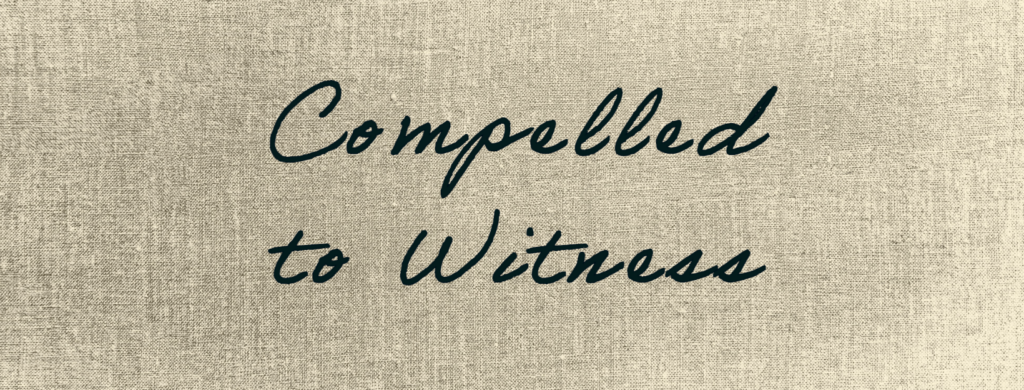Compelled to Witness: Learn More
Our Palestinian partners’ urgent call for change compels us to witness. In this time when a resolution to the conflict in Israel/Palestine seems as distant as ever, and advocacy for a particular kind of solution may not be effective, we support a rights-based approach. We pray for the day when pain and sorrow are relieved, and when peace and justice prevail for Palestinians and for Israelis.
Follow this link to read the full Compelled to Witness Pastoral Letter.
The pastoral letter includes eight commitments. Learn more about each of these commitments:
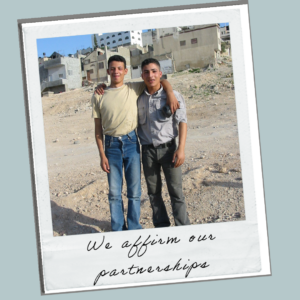
We affirm our faith relationships and partnerships in Israel/Palestine; we hear the urgent concern of church leaders there for the future of the Christian presence in the lands of our scriptures, especially impacted by prevailing circumstances.
The Christian Church (Disciples of Christ) nurtures relationships with more than a dozen partners in Israel/Palestine. Most are Christian churches and agencies carrying out important witness and ministry, but we also work with B’Tselem, an Israeli Jewish human rights organization, for example. Christian leaders in the region have consistently expressed their deep concern about the shrinking Christian presence, and the idea that the churches in the lands of Christ’s life and ministry, crucifixion and resurrection, are seeing their flocks shrink. The threats they face are many, including harassment by radical groups. Recently, the Patriarchs and Heads of Churches of Jerusalem issued a statement on this threat.
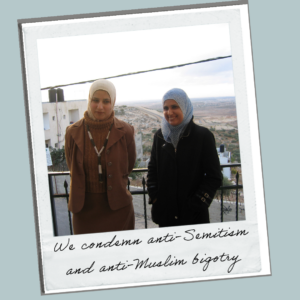
We abhor and condemn words and actions that insult or injure any person based on any aspect of their identity, including religious identity, and will continue to work against anti-Semitism and anti-Muslim bigotry.
The Christian Church (Disciples of Christ) participates in interreligious dialogue in the US that is organized by the National Council of Churches. Dialogue partners include American Jewish organizations, US Muslim agencies, and others. This happens primarily through Global Ministries and the Christian Unity and Interfaith Ministry (formerly the Council on Christian Unity). The Disciples are committed to opposing anti-Semitism in all its forms. Similarly, through participation as a founding member of Shoulder to Shoulder, the Disciples work to counter anti-Muslim bigotry.
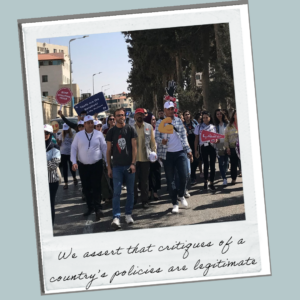
We differentiate between anti-Semitic discourse and action, which is on the rise in our countries and beyond, on the one hand, and legitimate criticism of the State of Israel’s laws, policies, and actions on the other.
Anti-Semitism in the world throughout history, including by Christians, is abhorrent. It is on the rise and we must be vigilant in calling it out. Stereotypes and tropes are especially dangerous. We must be aware of them, and oppose their perpetuation. We must be aware of Christian anti-Semitism, including the Church’s complicity in the Holocaust, and must ensure that our Jewish neighbors know of our commitment to be in right relationships.
Just as it is appropriate to be discuss and criticize US policies, and those of other countries, when they threaten or violate principles of human rights and international law, it is fair to be critical of Israeli policies and practices is fair. To criticize the policies of a government is different than expressing negative views of its people. Israel’s citizenry is about 75% Jewish (and more than 20% Arab Palestinian—both Muslim and Christian), and that population is certainly diverse in views on Israel’s policies toward Palestinians. The many Jews living in the US and other countries have varying views on Israel policies as well. It would be anti-Semitic to assume that all Jews feel the same way about Israel, and that Israel represents all Jews.

The continuing occupation, denial of rights, and injustice that Palestinians endure is not consistent with our understanding of God’s vision of justice for all people, and therefore is sin.
The Church is in a unique position to speak about humanity’s relationship with God, and with each other. The Church has an obligation and calling to speak responsibly, morally, and ethically, including naming sin when it witnesses grievous behavior that does not comport with our understanding of the scripture and Gospel messages. The Hebrew scriptures and the Christian texts teach us how to honor God’s love of humanity. When those teachings are violated, we experience sin. Israel has systematically denied rights to Palestinians living under occupation since 1967, and to Palestinians living as refugees since 1948. In the Kairos Palestine document, “A Moment of Truth” (December 2009), Palestinian Christian leaders write:
- “We also declare that the Israeli occupation of Palestinian land is a sin against God and humanity because it deprives the Palestinians of their basic human rights, bestowed by God.” (2.5)
- “The aggression against the Palestinian people which is the Israeli occupation, is an evil that must be resisted. It is an evil and a sin that must be resisted and removed.” (4.2.1)
- “We ask our sister Churches not to offer a theological cover-up for the injustice we suffer, for the sin of the occupation imposed upon us.” (6.2)
And in the “Cry for Hope” letter (July 2020), Kairos Palestine writes, “We declare that support for the oppression of the Palestinian people, whether passive or active, through silence, word or deed, is a sin.”
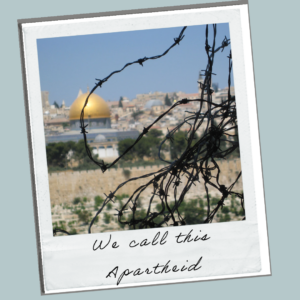
Israeli policies and practices that discriminate against Palestinians – Christians and Muslims alike – are consistent with the international legal definition of the crime of apartheid as defined in the International Convention on the Suppression and Punishment of the Crime of Apartheid (ICSPCA, 1973) and the Rome Statute of the International Criminal Court (2002);
According to the ICSPCA, the international legal definition of apartheid is, “inhuman acts committed for the purpose of establishing and maintaining domination by one racial group of persons over any other racial group of persons and systematically oppressing them.” The United Nations Convention on the Elimination of All Forms of Racial Discrimination defines “racial discrimination” as “any distinction, exclusion, restriction or preference based on race, colour, descent, or national or ethnic origin which has the purpose or effect of nullifying or impairing the recognition, enjoyment or exercise, on an equal footing, of human rights and fundamental freedoms in the political, economic, social, cultural or any other field of public life.”
Article 7 of the Rome Statute of the International Criminal Court (ICC) defines the crime of apartheid as “inhumane acts … committed in the context of an institutionalised regime of systematic oppression and domination by one racial group over any other racial group or groups and committed with the intention of maintaining that regime.”
In February, 2022, Amnesty International issued a landmark report entitled “Israel’s Apartheid against Palestinians.” The 280-page report documents and demonstrates how Israel systematically discriminates against Palestinians. Amenesty’s report was welcomed by Disciples partners in Israel/Palestine, including the Middle East Council of Churches’ Department of Service for Palestinian Refugees, Kairos Palestine, and B’Tselem. In February 2021, Human Rights Watch issued a 220-page report entitled, “A Threshold Crossed: Israeli Authorities and the Crime of Apartheid and Persecution.” And in January 2021, our partner B’Tselem itself issued a report called, “A regime of Jewish Supremacy from the Jordan River to the Mediterranean Sea: This is Apartheid.” These three major organizations’ declarations are significant. They support what our Palestinian Christian partners have been saying for two full decades. The Sabeel Ecumenical Liberation Theology Center in Jersualem spoke of the comparison between South Africa’s system of apartheid and Israeli systems against Palestinians in its “Jerusalem Document: Principles for a Just Peace in Palestine-Israel” (2000). The National Coalition of Christian Organizations in Palestine, which includes some of our partners like the YWCA of Palestine, the East Jerusalem YMCA, Sabeel, and the MECC’s DSPR, state that position clearly in a collective letter (June 2017).
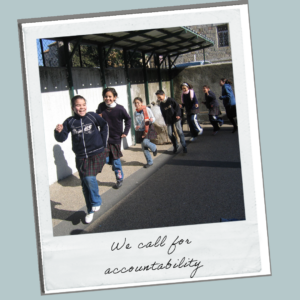
Our governments, especially the US government, have done little to hold Israel, a close ally, accountable to international law and conventions, UN resolutions, and even to US laws such as the US Foreign Assistance Act, the Arms Export Control Act, and the “Leahy Laws” which are designed to prevent the use of US military aid to military units that violate human rights. The US should apply such laws and standards consistently by conditioning its immense military aid to Israel upon Israel’s compliance with them.
The US has provided almost $150 billion in aid to Israel since 1949, including a current annual military aid package of $3.8 billion for the period 2019-2028 that was agreed upon by President Obama in 2016. This annual aid is sent with little or no conditions, and is subject to no apparent review, although Israel continually violates international law and conventions (including the illegality of the acquisition of land by force, the illegality of transferring its population into land it occupies, and various UN General Assembly and Security Council resolutions), as well as US laws which require US military aid recipients to meet certain human rights standards (the Foreign Assistance Act, the Arms Export Control Act, and the “Leahy Laws,” e.g.). These standards are applied inconsistently from one country to another, with the US applying sanctions on some countries for their violations of human rights, conditioning aid to others, or ignoring them completely, as in the case of Israel.
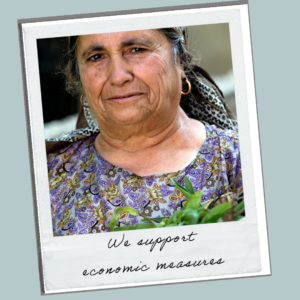
We support the use of economic measures to hold countries and companies accountable to standards of human rights and national and international laws. We oppose efforts to criminalize them in states and provinces, and nationally.
Economic measures are a non-violent form of leverage the churches and other civil society organizations have used to hold companies and countries accountable to principles of human rights and international law. Instances of the use of economic leverage include:
- Support for the Coalition of Immokalee Workers to seek fair wages for farmworkers who pick tomatoes used by major restaurant chains. The churches have affirmed boycotts of Taco Bell and Wendy’s in support of the farmworkers.
- Support for the Farm Labor Organizing Committee (FLOC) in the boycott of Mt. Olive Pickle Company in order to seek better wages for those who pick cucumbers.
- Support for United Farm Workers (UFW) in grape and lettuce boycotts aimed at securing fair wages for farmworkers.
- Opposition to the use of racially offensive names and logos by professional sports teams through boycotts.
- Participation in the Interfaith Center for Corporate Responsibility to promote socially responsible practices by various companies through shareholder activism.
- Divestment to oppose the policy of apartheid in South Africa in the 1970s and 1980s.
- Corporate engagement with and/or divestment from fossil fuel companies in the context of the climate change debates.
In the case of Israel/Palestine, more than 200 Palestinian civil society institutions called in 2005 for the world to use boycotts, divestment, and sanctions to end the occupation, ensure the rights of Palestinian refugees, and end discrimination against Palestinian citizens of Israel. Some of our denominational partners were among the organizations issuing this call, and others have supported this approach. Consumer boycotts of companies that profit from occupation – such as HP, Pillsbury, and AirBnB – are one effort that church members can do to promote better corporate practices. Learn more about how you can join consumer boycott campaigns with HP, Pillsbury and Paypal. Divestment or active non-investment in such corporations is another way to ensure that one does not benefit from the violations of other people’s rights and well-being. And calling for sanctions (such as conditioning military aid, as above) is a way to pressure Israel to end its military occupation.

We reject any theology or use of scripture to justify any system of discrimination, oppression, violation of any person’s dignity, or exclusivist claim on land, including Christian Zionism.
Scripture has been used to support systems of discrimination and oppression throughout history: slavery and racism, colonialism (around the world and the settlement of the United States—Doctrine of Discovery and manifest destiny), the Holocaust, and apartheid in South Africa to name a few. The church and individual church members have a responsibility to reject the use of sacred scripture to diminish the rights of any person, or worse.
Christian Zionism is an interpretation of scripture that seeks to bring about the second coming of Christ by supporting the in-gathering of Jews in the Biblical lands of Israel. Such an in-gathering is seen as bringing about the Armageddon end-times such that those Jews who accept Jesus Christ will be saved and those who don’t will be damned for eternity. This understanding of scripture privileges Jews in accessing land, at the expense of Palestinians, including Palestinian Christians, and is blatantly anti-Semitic as it sees Jews simply as a catalyst to bring about Christ’s millennial reign. You can learn more about Christian Zionism.

